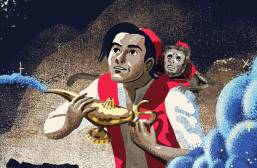Sinbad’s Choice: Legendary Thief or Hero of the Seven Seas?

Sinbad: Legend of the Seven Seas is the animated tale by Dreamworks that follows legendary thief Sinbad on a journey to understand who he is, where he stands, and what he will risk to uphold his values. When Eris, goddess of discord, frames him for the theft of the Book of Peace, Prince Proteus of Syracuse offers him a chance at redemption. Sinbad must not only prove his innocence by finding and returning the book, while Proteus stays behind in a prison cell, but he must also be willing to return empty handed and accept the unjust death penalty before they execute Proteus. The problem is that as much as Sinbad wants to be a hero, he does not believe it is possible to change, and Eris does her best to make sure he never does. “Face it,” Eris commands Sinbad. “Your heart is as black as mine…In your heart you know Proteus is going to die because he saw something in you that just. Isn’t. There.” Through the course of an internal war, represented by Marina as harmony and Eris as chaos, Sinbad will resolve that only he can truly know himself, and that choice, not destiny, determines the course of the future.
One would think that, since the Book of Peace is central to Sinbad’s hero’s journey, its importance would be given a better explanation, but the fact that it is so obscured increases its metaphorical value, making what Sinbad seeks not the book itself but the peace it represents. That he seeks peace of mind is doubtless. He is at war with himself, deciding who he is and what he could be. Its home is to be Syracuse, where it will allegedly continue to protect the city-states. The mechanism behind this defensive capability is all but unknown.
What is given is that losing the Book of Peace is a high enough offense to bring death upon the future King. All that changes when it is stolen is that a few cracks spread through the pillars and a cloud of darkness overtakes the sky. Beyond these symbolic changes, peace is not disturbed with the loss of the book. Still, Syracuse threatens to bring chaos down upon itself and be, as Eris says, “left without the next rightful King and tumble into glorious chaos.” In this way, Eris thrills in seeing mortals undo themselves. The book takes on purely metaphorical value—Eris is guilty of taking peace away, and Sinbad seeks inner peace.
Eris maintains a daunting image to make herself seem much more powerful than she really is and therefore exert a stronger influence upon mortals like Sinbad. She is the devil on Sinbad’s shoulder, the vehicle of character development, and the bleakness of predestination, and she would like you to think that she is a force of inevitability. She is not just the goddess of discord, she is discord, and that means that when all should be “smooth sailing,” Eris would rather see others choose to destroy their own futures.
Although the way Eris looks down on the world as though through a magic mirror makes her seem omniscient, Eris’ power is limited to events in the present. She is also limited in that she cannot force chaos to happen. Eris relies on mortals’ own follies to produce the “favorable” negative outcomes she desires and she manipulates people by claiming to have some divine understanding of who they really are. After all, Eris believes “you humans are so predictable.” But Eris’ limitations are visible when she performs some of her evil deeds herself, forcefully directing how the pieces shall fall apart, such as when she frames Sinbad for the theft he does not, ultimately, commit.
The two identities that Sinbad is torn between will lead to two very different outcomes. On the surface, however, it seems as though he has it all figured out: finish one more job (depriving Syracuse of the Book of Peace), and retire in Fiji happily ever after as a retired, worry-free thief. The Islands of the Blest greatly resemble Sinbad’s retirement plan, but it is a place known in Greek mythology as being, “where the virtuous dwell after death, retaining their faculties and enjoying a life free of care” (Parada). He doesn’t expect trouble, much less a moral dilemma, to come between him and paradise on his quest to steal the book, but his way is blocked by none other than the embodiment of noble heroism: Prince Proteus himself. The two were once close friends, but one day, Sinbad fell in love at first sight with the woman Proteus was to marry and everything changed. Sinbad recognizes that day as being the pivotal point when he accepted as fact that he would never be a hero like Proteus. He took to the seas, shaping his identity as that of a thief, and never looked back.
Sinbad ran away partly because he was ashamed at the class gap between himself and the prince, and this feeling of inadequacy is directly linked to his belief in predestination. Sinbad believes that, as a Prince, Proteus will always get the opportunities he wants, but as a boy living on the streets, he himself will never grow into the shoes of a legitimate hero. When these two meet, they fight off a sea monster sent by Eris to take the Book of Peace, and Sinbad is dragged down into the ocean depths for an interview with destiny (AKA Eris). Eris promises him riches enough to buy his own island, enough to buy his way into heaven, if he will only steal the book for her. It is not addressed that Eris doesn’t need him or a sea monster to get what she says she wants.

She could easily steal it on her own, and it takes some time before the viewer fully understands that Eris doesn’t just want the book, or even Proteus’ death, but to watch one character undo himself, and everyone he cares about in the process. This is a story about choices, and that means there must be another character to offset this overwhelming pressure exerted by Eris. If Sinbad is to be truly persuaded to evil, then good must also be represented as a being whom he must reject.
Interestingly, this being of good is not divine; Sinbad does not call upon another God or Goddess to aid him against this immortal foe, nor does any volunteer their guidance. Not Poseidon, to bless his voyage, nor Allah, the original divine force in One Thousand and One Nights from which Sinbad: Legend of the Seven Seas is derived. This gives Sinbad the opportunity to make the right choice without divine intervention. To this purpose, Sinbad is intentionally not portrayed as a very religious man. He does not immediately recognize Eris from her likeness in the temples and does not to mutter, “Gods,” as Proteus does when they are in mortal danger. He fails to see the irony in setting Tartarus as the rendezvous place, when it is the cursed place where criminal souls are sent to receive torturous punishments.
Those sentenced to Tartarus are those who have committed the worst betrayals, “hated their own brothers, those who struck their parents, those who loving fraud entangled their clients, those who kept their wealth for themselves without ever sharing (these are the majority), those who killed for adultery, those engaged in treason, those who corrupted the laws and became dictators, those who entered the beds of their daughters, and others who committed numerous crimes which would never cease to fill an unending catalogue” (Parada). It is not unfair to say that Sinbad does not consider his soul to be in danger for turning his back on Proteus, but rather that he is more concerned with immediate satisfaction and physical risks. It is also understood that Sinbad wouldn’t call upon divinities of good because he is genuinely interested in achieving the prize Eris promises him. Sinbad does abandon their partnership, however, when his heart becomes involved. The woman with whom Sinbad fell in love at first sight, the one who makes him flee the would-be crime scene, and the being who will represent harmony in opposition to Eris are all one and the same. She is Marina.
As a regular human, Marina is actually an appropriate choice to stand opposite of the supernatural Eris in a fight between choice and fate. Marina is the angel upon Sinbad’s shoulder, which is why it was so necessary for her to stow away on his ship. Her mission? To make sure Sinbad does the right thing, and rescues Proteus. Sinbad is too far down the wrong path—not the path of evil, but the path of selfishness and irresponsibility. This isn’t some grand crusade of Marina’s to save Sinbad from ruining himself. It is a combination of her own thirst for adventure, her willingness to restore her own faith in humanity, and her desire to protect the innocent.
Simply that Marina is willing to restore harmony makes her the perfect being to oppose the manifestation of discord. Sinbad needs a good shove in the right direction. His crew can’t help with that. Not even Kale, ever the loyal voice of reason. Sinbad needs someone who doesn’t simply arouse his conscience but also affirms that he has a heart. Seeing Marina in the middle of his almost-heist doesn’t necessarily make Sinbad decide morally against stealing the book, but it certainly exposes that he does have a heart by reigniting his desire to run away from love. She must run after him, so that he can confront and resolve the conflicting emotions raging within him.
Marina is not so ignorant as to trust Sinbad to do the right thing on his own and must give volume to the voice of conscience she hopes exists within him. Sinbad doesn’t believe it is his responsibility to save Proteus, telling Marina, “Hey! This is not my problem. I did not steal the book…I’m not responsible for this mess and I didn’t ask Proteus to put his neck on the line for me!” Furthermore, he believes it is impossible for Proteus to die. Remember, just as Sinbad now believes that he is undeserving of the future he desires as a hero, so too does he believe that Proteus’ fate cannot be altered. Proteus is a good man, a noble prince, and an only son of a rich and influential family. Such character and connections surely secure him a happy ending, safe from injustice. Of this naïve notion, Marina intends to disabuse Sinbad.

When Marina tells Sinbad, “Because, me? I know I’d be tossing and turning knowing I’m alive because I let my friend die,” she isn’t doing what Eris does–throwing harmonious thoughts into chaos. She is in fact championing for his conscience, and by bringing the conflict deep inside of him to the foreground, she is making the danger become much more real to him. Proteus will die, unless Sinbad, the one person who can save him, does what he said he would do.
Marina believes Sinbad will do the right thing, Proteus believes he will stand by his word, and it is up to Sinbad to decide if they are right to trust his goodness, or if Eris knows him better. Each side puts Sinbad’s morality into question, hoping he will give them the answer they desire. Marina asks about his identity as a way to break his mysterious shell and figure him out: “First you try to rob Proteus, and then you save his life. So which are you? A thief or a a hero?” She receives no answer, truth or lie, as he vanishes from sight. The second time, it is asked by Eris during the test that will determine whether or not she will give him the book. Eris explains the rules of her game like this: “I’ll ask you a question. One, simple, question. If you answer truthfully, the book is yours…So here’s my question, Sinbad: if you don’t get the book, will you go back to die?”

Sinbad knows that everything hangs on this question. He must answer truthfully, and that means he must be true to himself. If he can do this, then he can truly thwart “destiny.” In a way, this is a chance for Sinbad to choose once and for all who he truly is, and what the true him will do.
Unlike Marina, when Eris brings into question Sinbad’s allegiance to evil or good, it is done so rhetorically, as though she already can see his future actions and read his mind. This gives her the illusion of being more powerful than she actually is. Eris cannot see the future, but she does wish to shape it. This time, she underestimates the resistance of the mortal she lures to disaster. According to Eris, Sinbad is selfish and cruel, and she wishes only that Sinbad to prove her right by claiming it as his identity. When he prematurely believes that he has lost the challenge to Eris, he is cast out of Tartarus, beyond the reach of the Book of Peace, and apologizes to Marina. “Eris is right about me….It wasn’t the truth. It was me trying to pass myself off as someone I’m not.” What Marina must remind him is that Eris cannot see the truth in his heart, does not care for him, as she does, and that he has only truly lost Eris’ game if he does not follow through with his claim.
Finally accepting that he could not possibly live happily with the current dissonance in his life, Sinbad goes back to Syracuse empty handed, and in doing so changes the future. It is important to note that that Sinbad does the right thing, even when he believes it means his own destruction. Eris did her best to trap Sinbad, but he restores harmony simply by being true to himself and trusting his heart. Realizing that he is in control of his actions, and their consequences, he finds himself released from Eris’ power and she is forced to return the Book of Peace just as she vowed. Proteus is saved, the Book of Peace releases and returns light to Syracuse, and Sinbad unwittingly beats Eris at her own game. The philosophical message woven into this chain of events is simple and beautiful: One cannot lie about the future because the future does not exist. Every choice matters, and Sinbad’s culminate to this harmonious conclusion because he refuses to give up on himself.
Works Cited
Parada, Carlos. “Islands of the Blest.” Greek Mythology Link. N.p.,1997. Web. 1 Apr. 2014. <http://maicar.com/GML/IslesBlest.html>.
Parada, Carlos. “Underworld and Afterlife.” Greek Mythology Link. N.p., 1997. Web. 31 Mar. 2014. <http://www.maicar.com/GML/Underworld.html>.
Sinbad: Legend of the Seven Seas. Dir. Patrick Gilmore and Tim Johnson. By John Logan. Prod. Mireille Soria, Jefferey Katzenburg, Jill Hopper, and Dino Athanassiou. Perf. Brad Pitt, Catherine Zeta-Jones, Michelle Pfeiffer, and Joseph Fiennes. Dreamworks, 2003. DVD.
What do you think? Leave a comment.











This one has a great OST- I bought this soundtrack actually before seeing the film, and as I listened to it, I just kept thinking to myself… This is incredible! There is a myriad of emotions expressed, as well as a catchy theme or two, and the Sirens song is just breathtaking.
I think the only thing that went worng was the score (sucks sucks sucks!), it could have been cooler with Rock music (like in shrek, i’m thinking about a lot of Smash Mouth and Linkin’Park songs)or songs (a musical feature like beauty and the beast).
You want to replace the awesome Harry Gregson Williams score with Smash mouth and Linkin Park?!?!?!?!? HAHAHAHAHAHAHAHAHAHAHAHAHA! Good one! You must be related to one of those insipid studio executives who release the ‘soundtrack’ of a movie with a whole lot of unrelated rock songs “inspired” by the movie but never “IN” in the movie and don’t release many excellent motion picture scores. I would mark you as a studio PLANT, if it weren’t the sad but true fact that people who have this opinion are large enough part of the soundtrack buying public such that studio suits pander to them. Go run along and buy some rock music albums. There are TONS Of those out there, completely unrelated to motion pictures. There are NOT, however, enough good scores for the rest of us.
I’ll have to pay attention to the music next time I watch this. From the comments it seems like people either love or hate it! While I don’t think that Linkin Park would fit into the movie (unless it was instrumental only) I would like to see a well made fan video of “Sinbad” with their song “In the End.”
Easily the best sccene is when Sinbad and his crew just entered into the point of no return. There where ships from the past devastated and you wondered why. Soon you find out when mystic seductive Ghost infringe on all the males. If you listen to the score it is absolutely fabulous as they try to seduce them. But the woman not being effected saves the hour.
Sinbad is an old classical character/tale.
I’m glad they didnt destroy it in the process of trying to make it more audience-friendly, which would’ve been the case if the movie hadnt been such a cliché.
It would be like changing the bible, or the LotR movies. Everyone knows the story, how can you put yourself to tamper with that…
I think people would’ve been more disappointed if they had change anything.
I know why animations are all flopping in the box offices nowadays.
(Exceptions: Pixar animations/Japanese animations)
It’s because they’re all drawing about adventure stories!!
Back then we had Sinbad, El Dorado, Atlantis, Treasure Island,…
It’s great adventure stories, but people DON’T want to see those.
Those kind of adventures, people would rather see it in real life.
I think I hear what you are saying–That CGI is so advanced now that people would rather see live action adventure movies?
Always found Sinbad to be one of the most honestly made anti-heroes in children’s’ animations. This one and Treasure Island have given me many new ideas for adventure stories of my own.
Thank you for this. I appreciate being able to connect to my inner child with this one.
Sure thing! It’s an important exercise, I believe.
The characters were beautiful, I particularly liked the handling of Eris with the swirly-smoke thing going on. The story was good. I was afraid they’d disappoint me, but no! The CGI… well, it stuck out a bit. However, I found that easy enough to ignore. I was too busy enjoying myself. A job well done, wouldn’t you say.
Good article! I like how you focus on Sinbad beating Eris at her own game. A more traditional story might have let Sinbad succeed in getting the Book of Peace the first time. However, to see the hero rise again after initially being beaten shows a deeper kind of character development. Your article brings out this deeper truth behind the story.
I actually didn’t realize Sinbad was in One Thousand and One Nights. I’ve been meaning to read that book for ages, and now I have even more reason to do so! 🙂
Beating her unwittingly, and therefore honestly!
Thanks.
This was such a great movie and I like the take you put on it. I remember it was controversial though, because as you said it was derived from a Thousand and One Nights, an Arab tale that was not acknowledged in the movie and instead passed off as more Roman. Either way, great movie, great article and if you’re interesting, writing an article about the implications behind such a change might be fine.
I did consider writing on that, yes. Maybe they ironically thought they were avoiding controversy by focusing more on a legendary tone than a religious one by making the change. Either way, it is a bummer that they didn’t keep the character in context. Thanks for reading!
This is such an underrated movie and one of my favorites! Thank you for the analysis 🙂
This is showing the development of a healthy romantic relationship.